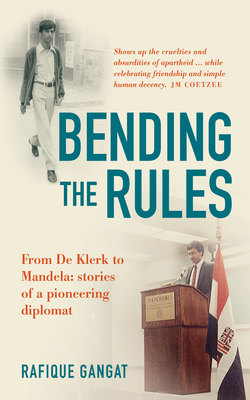Читать книгу Bending the Rules - Rafique Gangat - Страница 11
На сайте Литреса книга снята с продажи.
SMOKING GRASS FOR SANITY’S SAKE
ОглавлениеMy brilliant rationale
During my first month at university I bumped into Mark; we’d played intercity cricket against each other during the short-lived multinational sport experiment. He invited me over to his digs next to the campus for a party the following weekend.
I went along that Friday evening in 1979 to an otherwise all-white, English party. As I blended in, I figured out why I’d been invited to this liberal social occasion: I was brown (Indian), well dressed, well spoken and well mannered.
After Mark had introduced me to all and sundry, I watched him showing off his brown friend to his liberal peers and wondered if I would really have been there if my complexion was a few hues darker.
I noted that his friends were all upper-middle-class students – beneficiaries of the apartheid system who merely paid lip service to liberal notions of equality while continuing to enjoy a materialistic, hedonistic lifestyle on the backs of exploited black labour. Feeling disappointed after gaining this insight, I detached myself from the group and went into the garden.
When I caught Mark’s eye, I asked if it was okay for me to roll a joint and smoke it discreetly in a corner. He agreed. Although I’d become pretty adept at removing the tobacco from a cigarette and replacing it with grass, I was engrossed and didn’t notice a woman who’d seen me step outside.
Suddenly, I heard a sweet voice in a “proper”, clipped English accent saying, “What’s a nice guy like you doing, smoking that?”
I looked up into the prettiest green eyes, expressing sincerity and warmth. Yet my defensive retort was, “Who are you and what do you do?”
“I’m Sue, I’m a student nurse and I share this house with your friend Mark and the others.”
“Nice to meet you, Sue, Mark said it was okay for me to smoke; is it okay with you?”
And Sue nodded.
Then I asked her, “At which hospital do you work?”
“Grey’s hospital,” she answered.
“Now do you really want to know why a nice guy like me smokes this? Let me tell you a story. I was born in Grey’s hospital, in the Lakhi ward, named after a wealthy Indian philanthropist who generously contributed to the building of the hospital in the 1950s. As a gesture of appreciation, the hospital accorded Indian women access to the maternity wing that bore his name. Nowadays I can’t even enter or visit the place in which I was born because it has become a whites-only hospital, even though I drive past it daily to attend a white university for which I had to obtain special permission from the Minister of Law and Order to study isiZulu, a black language that is not offered at my Indian university in Durban. And to top it all, my Zulu lecturer is a black man.”
After a moment’s pause, I added, “To cut a long story short, I smoke grass to distance myself from this crazy reality, and to maintain my sanity.”
Sue expressed sincere sympathy, then added, “I know the Lakhi ward, the plaque is still there and I work in the maternity wing. I had no idea that he contributed financially to the building of the hospital and that he was Indian.”
That moment was the beginning of a friendship that led to a relationship, the circumstances of which were, to say the least, surreal. Although I could not visit the place where I was born, I was sleeping with a white woman who delivered babies there. Our affair contravened the apartheid laws, but then I had cover, being a student at a white university.
Later, I learnt that my liberal friend Mark had designs on Sue. To get her away from me he had gone to the extent of informing the police about our relationship. As a result, I was picked up one afternoon and questioned extensively about the nature of my relationship with Sue. As the police had no proof and I was able to show them a copy of the consent of the Minister of Law and Order to study at a white university (which intimidated the junior officers), I somehow escaped prosecution.
But the heat got to Sue and we parted.
This was a general manifestation of white liberal politics at the time – meaning that for some paying lip service had its boundaries. If those limits were transgressed, raw racism reared its ugly head, exposing liberalism for what it really was: racism dressed in elegance and fine words.
